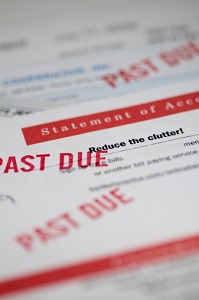 If you fear going to the mailbox each day because you dread seeing collection letters, you are not alone. Many Americans are unable to pay their bills and they are facing the same financial stress that you are experiencing. Even with the restrictions imposed on collection agencies through the Fair Debt Collection Practices Act, collection agencies still find ways to harass people in an attempt to collect a past due debt. For most people, this becomes an ongoing nightmare as their financial situation worsens and the collection letters not only continue but also become increasingly threatening and ominous.
If you fear going to the mailbox each day because you dread seeing collection letters, you are not alone. Many Americans are unable to pay their bills and they are facing the same financial stress that you are experiencing. Even with the restrictions imposed on collection agencies through the Fair Debt Collection Practices Act, collection agencies still find ways to harass people in an attempt to collect a past due debt. For most people, this becomes an ongoing nightmare as their financial situation worsens and the collection letters not only continue but also become increasingly threatening and ominous.
Even though it may seem there is no way to stop collection letters, you do have several options for dealing with collection agencies and for solving your financial problems.
Send a Written Letter of Dispute
To dispute a debt, the dispute must be in writing and should include your name, address, the name of the original creditor, the account number and the disputed amount. Use certified mail/return receipt requested when mailing the letter so you have proof the collection agency received your letter. Under the Fair Debt Collection Practices Act, if you write a letter to the collection agency disputing the debt, the collection agency must not contact you again unless they first provide evidence that you owe the debt. Unfortunately, the collection letters will continue again once the collection agency provides evidence (i.e. a copy of your contract, loan agreement or credit application) that you are legally responsible for repayment of the debt.
Make Arrangements for Payment
If you have the ability to make monthly payments on the account, you should discuss payment options with the collection agency. This stops the collection letters and allows you to pay the debt and clear it from your credit report. If the collection agency agrees to accept monthly payments, request written confirmation of the agreement and retain copies of all correspondence and evidence of payments in case of a future dispute.
Debt Consolidation Loans
You may be tempted to borrow money to pay your unsecured creditors to stop the collection letters; however, this is not a solution to your financial problems. Debt consolidation loans work for individuals who are able to pay their debts but are seeking to combine multiple accounts into one lower monthly payment or to get a lower interest rate through a home equity loan. This is a risky way to pay off unsecured debt because if you default on the debt consolidation loan, the creditor will file a foreclosure action to sell the collateral for the loan. You will lose your home if your financial situation worsens and you cannot make the payments on this secured debt consolidation loan.
File a Chapter 13 Bankruptcy Case
In some cases, the collections letters are piling up because you cannot afford to pay all of the debts in full and monthly payments on each debt are not feasible given your current financial situation. When medical bills, credit cards or other personal debts are too overwhelming to handle, a Chapter 13 bankruptcy stops collection letters and gives you the ability to reorganize your debts into one affordable monthly payment. When you file a Chapter 13 bankruptcy case, the automatic stay provisions provided in the Bankruptcy Code prohibit creditors and collection agencies from contacting you or continuing any collection actions during the pendency of the bankruptcy case. When you complete all of the payments under your bankruptcy plan, any remaining unsecured debts that were not paid on the plan will be discharged. A Chapter 13 bankruptcy stops collection letters and resolves your financial problems at the same time.
File a Chapter 7 Bankruptcy Case
If you are drowning in unsecured debt that you are unable to pay after paying your basic living expenses, you may be eligible to file a Chapter 7 bankruptcy case. A Chapter 7 case has the same effect as a Chapter 13 case because the automatic stay provisions put an immediate stop to creditor harassment and collection letters. In about four months you could receive a bankruptcy discharge that releases your legal liability for the unsecured debts. Creditors are permanently barred from trying to collect debts that are discharged in bankruptcy.
The one thing to remember when dealing with collection letters and creditors is that you have rights and laws exist to protect you from creditor harassment and unfair or deceptive collection practices. As bankruptcy attorneys, we understand how stressful financial problems are and we are here to help you resolve your debt problems so that you can begin to recover from a financial crisis. Request a free bankruptcy consultation today to see how bankruptcy can help you.



